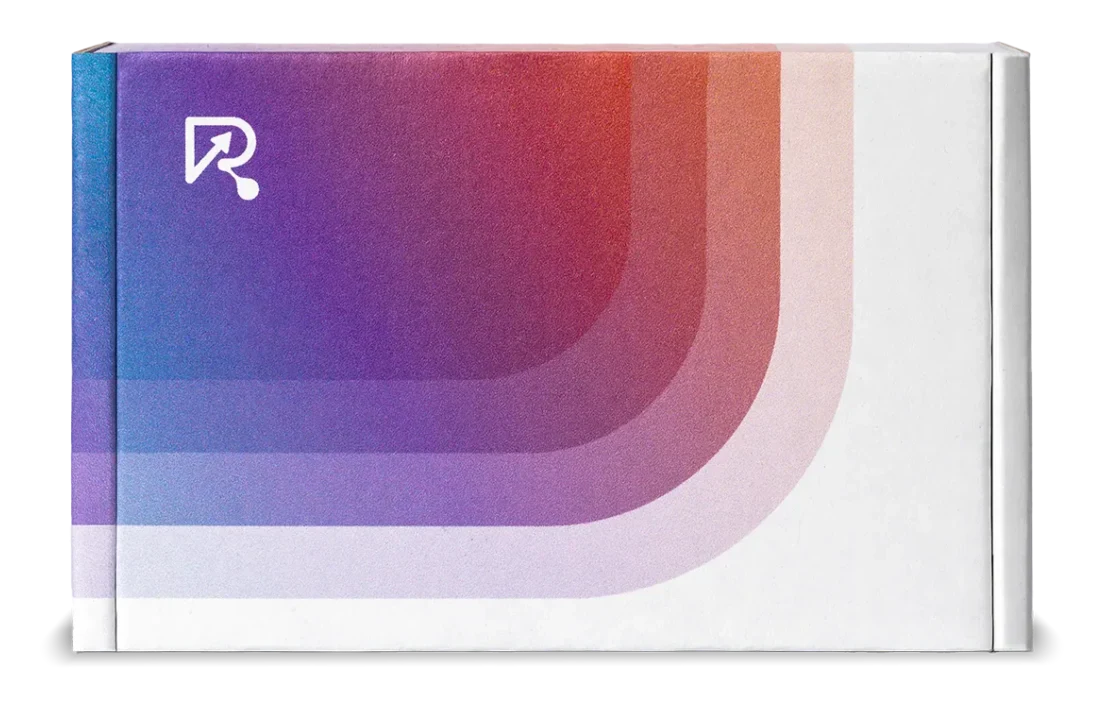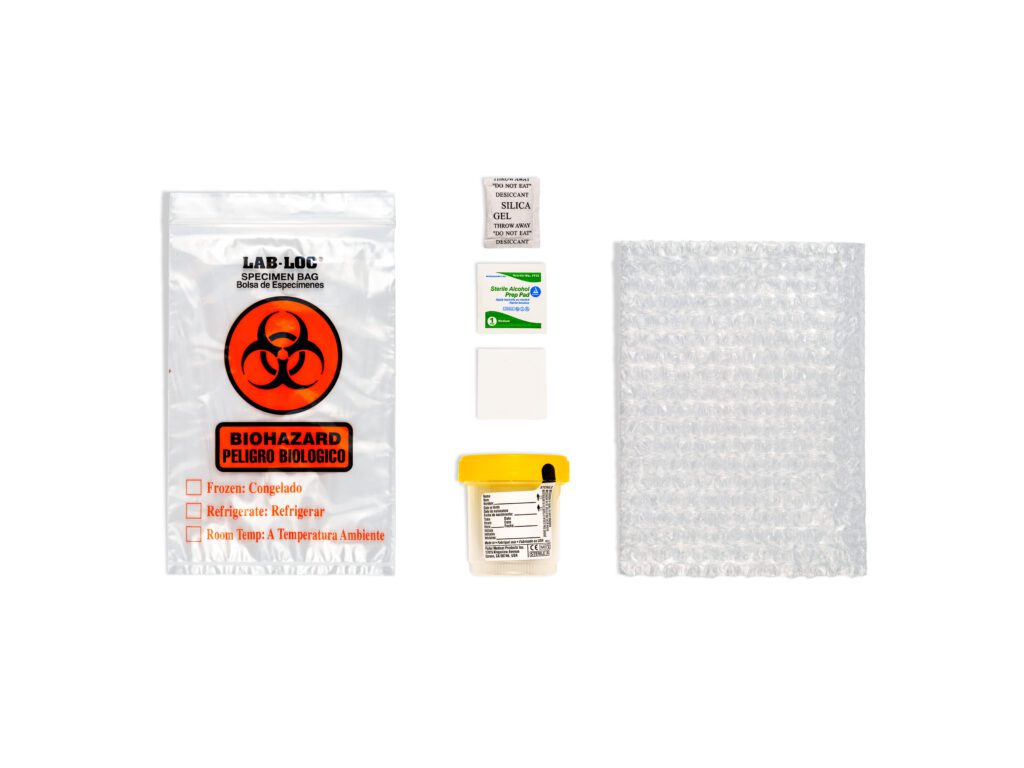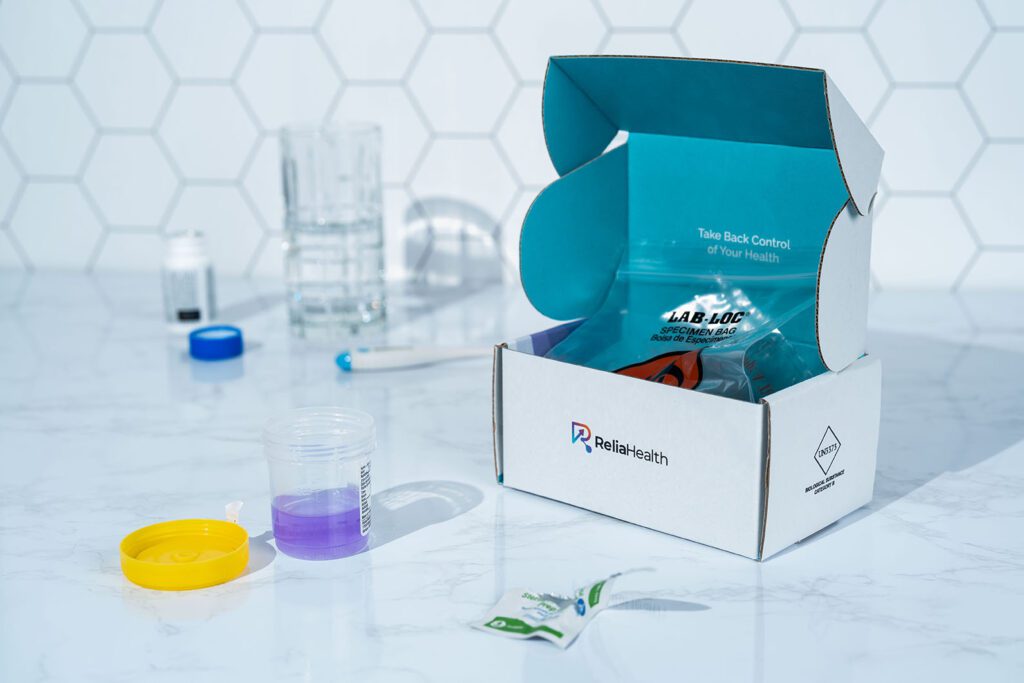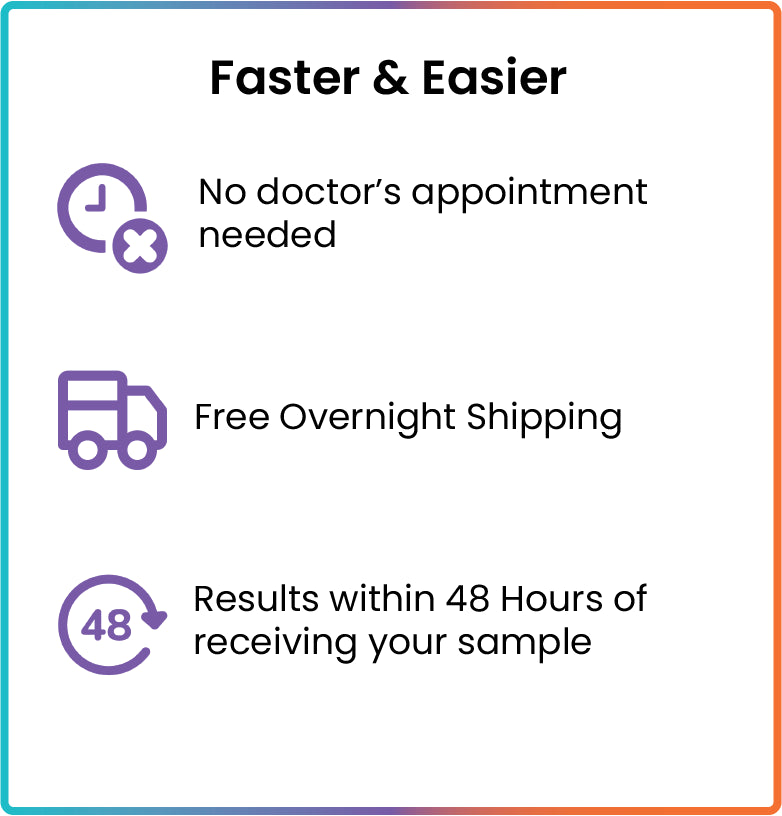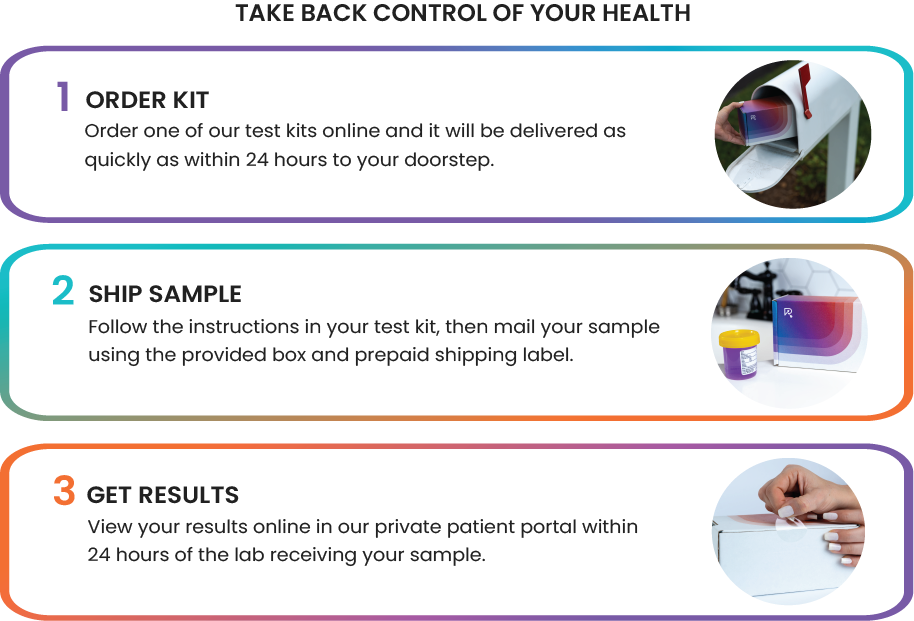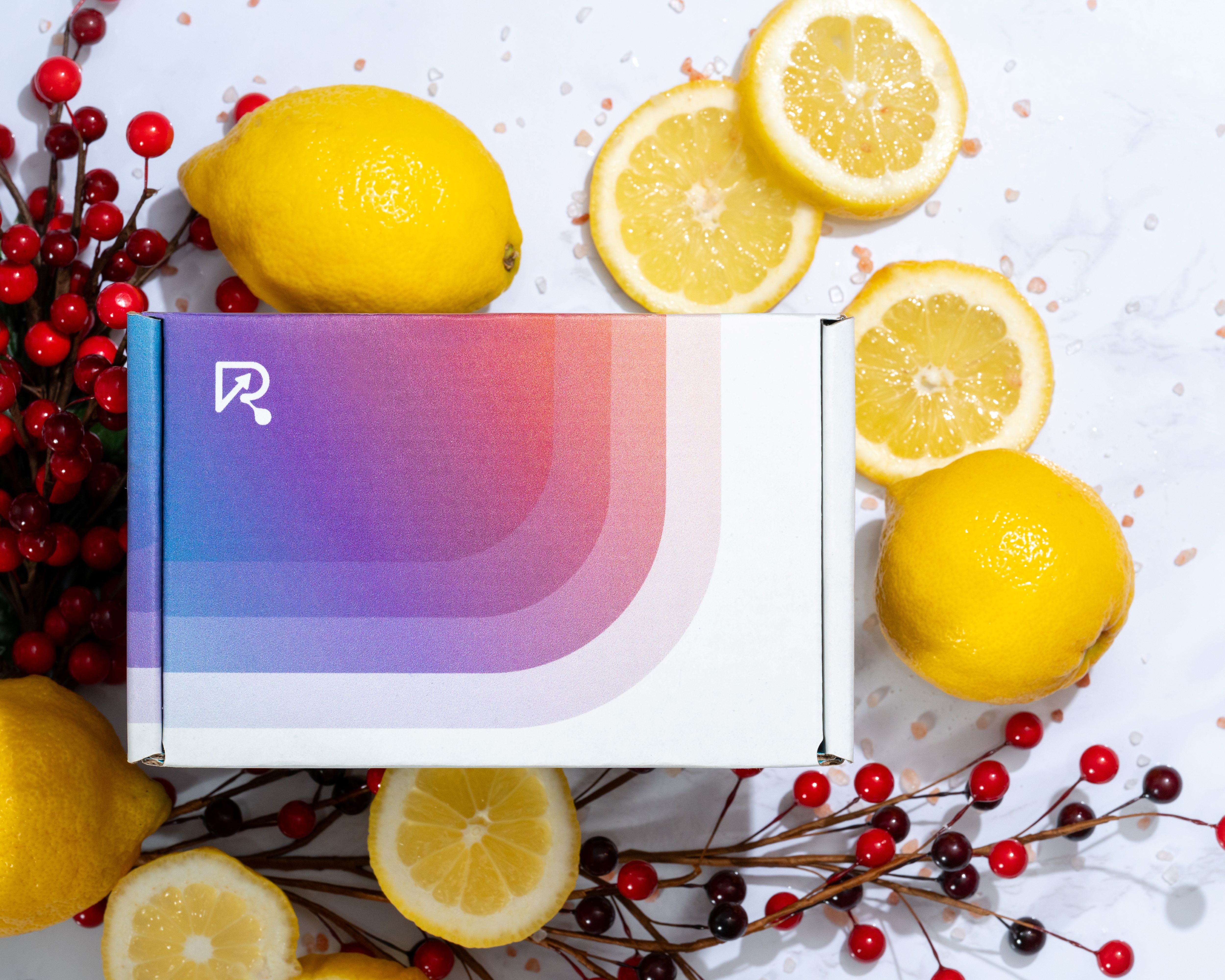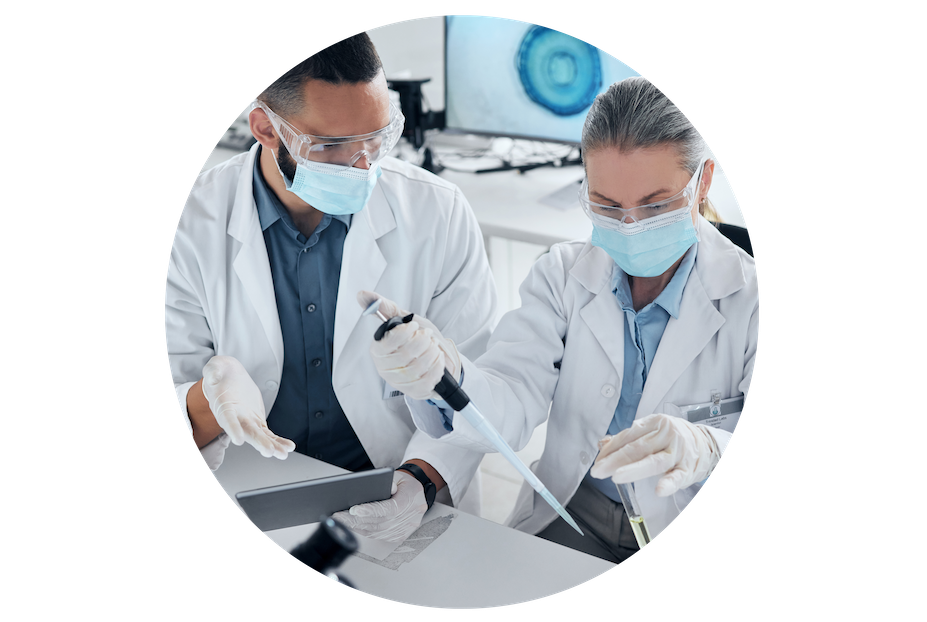
Physician
trusted

Antibiotic sensitivity panel included

Highest level of accuracy available

Results in Under 48* Hours

Telehealth
Compatible

HSA/FSA
Accepted
Not available in NY, AK, and HI
Details
What sets ReliaHealth UTI tests apart from all others?
ReliaHealth uses RT-PCR (Real Time Polymerase Chain Reaction) testing versus the standard culture test administered by most medical professionals. In fact, our PCR tests have a 98% Sensitivity Rating* versus 50% for standard culture tests.
PCR testing is a relatively rapid process, providing results in under 48* hours.
Why does accuracy matter?
- Studies [1] have shown that 26-44% of women will have recurring UTIs due to the failure of the initial treatment.
- Over the counter UTI test strips are only 30% reliable [2] which means you may receive a negative UTI test result, even though you have an infection.
- UTIs are the seventh most common reason for a patient to be seen in an emergency department in the US, constituting over 1 million visits annually. [3]
What sets ReliaHealth UTI tests apart from all others?
ReliaHealth uses RT-PCR (Real Time Polymerase Chain Reaction) testing versus the standard culture test administered by most medical professionals. In fact, our PCR tests have a 98% Sensitivity Rating* versus 50% for standard culture tests.
PCR testing is a relatively rapid process, providing results in under 48* hours.
Why does accuracy matter?
- Studies [1] have shown that 26-44% of women will have recurring UTIs due to the failure of the initial treatment.
- Over the counter UTI test strips are only 30% reliable [2] which means you may receive a negative UTI test result, even though you have an infection.
- UTIs are the seventh most common reason for a patient to be seen in an emergency department in the US, constituting over 1 million visits annually. [3]
Bacterial Panel |
Antibiotic Resistance Classes |
Acinetobacter baumannii |
Methicillin |
Aerococcus urinae |
Vancomycin |
Cirtrobacter freundii |
Carbapenemase |
Citrobacter koseri |
MRSA |
Corynebacterium riegelii |
Sulphonamide |
Corynebacterium urealyticum |
Beta-lactamase C |
Enterobacter aerogenes |
Trimethoprim |
Enterobacter clocae |
Quinolones |
Enterobacter faecalis |
Beta-lactamase A |
Enterobacter faecium |
|
Enterococcus faecium |
|
Escherichia coli |
|
Klebsiella oxytoca |
|
Klebsiella pneumoniae |
|
Morganella morganii |
|
Proteus mirabilis |
|
Proteus vulgaris |
|
Providencia stuartii |
|
Pseudomonas aeruginosa |
|
Serratia marcescens |
|
Staphylococcus aureus |
|
Staphylococcus saprophyticus |
|
Streptococcus agalactiae (group B) |
|
Mycoplasma genitalium |
|
Ureaplasma urealyticum |
|
Fungus |
Candida dubliniensis |
Candida albicans |
Candida glabrata |
Candida parapsilosis |
Candida tropicalis |
- Looks for 23 different types of UTI-causing bacteria as well as STI and BV causing bacteria
- Identifies 5 types of Candida, a yeast infection causing fungus
- Detects 18 antibiotic resistance genes within 9 classes of commonly prescribed antibiotics
- The ReliaHealth antibiotic resistance panel conducts a hyper-specific diagnosis using PCR technology allowing you to obtain the correct prescription of the antibiotic that will get rid of the bacteria in your UTI.
- Reveals up to 500% more pathogen information compared to other testing modalities for the most accurate and specific diagnosis.
- Results shared online – no office visit necessary
- Same day telehealth appointment available
- Free overnight shipping & prepaid return label
- Symptoms vary greatly depending on the severity of your urinary tract infection (UTI). Both women and men can get a UTI; however, Women are at a greater risk of developing more severe forms of a UTI than men. UTIs don’t always cause symptoms, but here is a list of symptoms those infected often experience:
- A burning sensation when urinating
- A frequent urge to urinate
- Passing small amounts of urine
- Strong smelling urine
- Cloudy urine
- Discolored urine that can be red, bright pink, or dark.
- Women may experience pelvic pain. - UTIs are often overlooked or misdiagnosed. Getting tested is critical to pinpoint the cause of your condition.
- Yeast infection symptoms may include:
- Itching, soreness, redness, swelling, pain during sex or urination, and a thick, white discharge that looks like cottage cheese
How to Collect & Ship Your Sample
Steps
1. PREP
Wipe your hands with the included 70% isopropyl alcohol pad.
2. COLLECT
Use the included sample cup to catch the first amount of urine produced, and ensure at least 20mL of urine is captured.
3. CLOSE
After collecting your sample, place the cap back on the cup and turn until you hear a click, which signifies that you have correctly closed the cap. If the lid is not on properly there is a risk of your sample leaking and not being usable.
1. PREP
Wipe your hands with the included 70% isopropyl alcohol pad.
2. COLLECT
Use the included sample cup to catch the first amount of urine produced, and ensure at least 20mL of urine is captured.
3. CLOSE
After collecting your sample, place the cap back on the cup and turn until you hear a click, which signifies that you have correctly closed the cap. If the lid is not on properly there is a risk of your sample leaking and not being usable.
1. PACK
Place the tightly closed urine sample into the provided biohazard bag with the provided silica packet.
2. WRAP
Wrap the provided bubble wrap around the urine sample and place it back into the box.
3. SEAL
Tape the box shut using the provided sticker seal.
4.SHIP
There is a prepaid label already on the box, so simple drop the box off at your nearest UPS or USPS location.
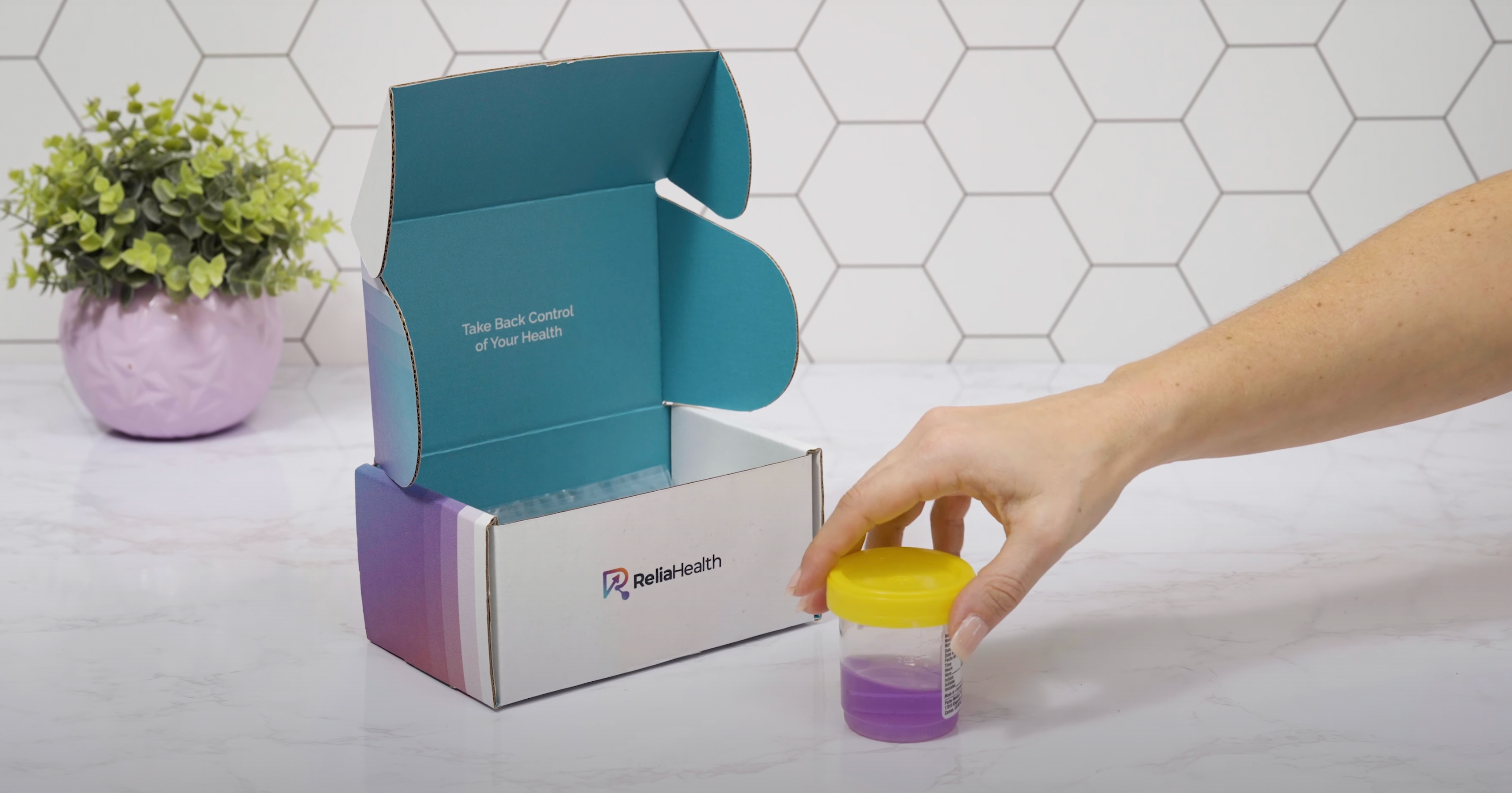
ReliaHealth: Collect Your Sample
Accuracy Ratings
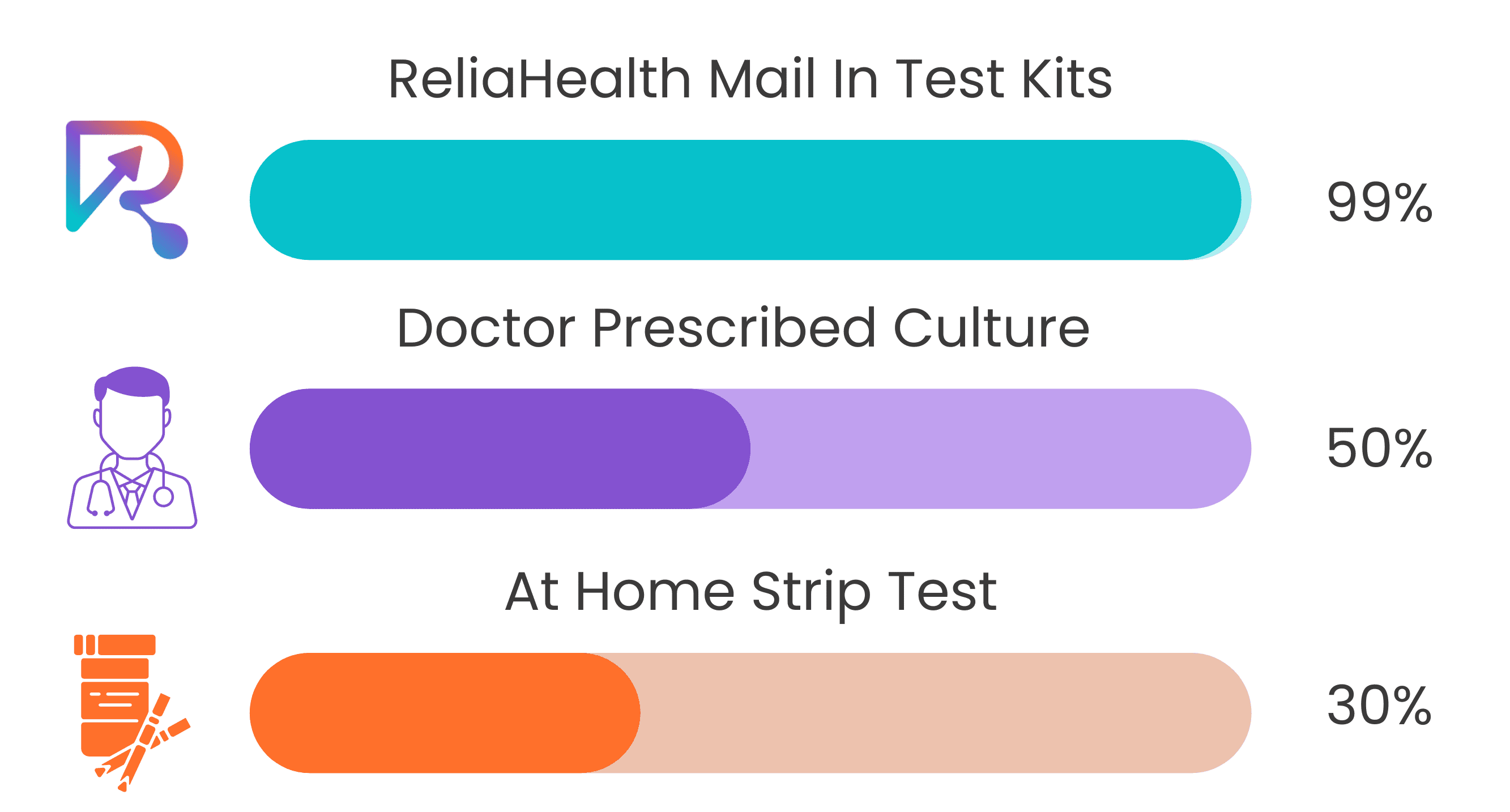
How Do ReliaHealth Tests Compare?
Infections can’t be properly treated without knowing the specific cause. ReliaHealth PCR tests are highly sensitive and pick up on biomarkers often missed by the current industry-accepted tests.
Every sample is analyzed utilizing state of the art technology in a CLIA Certified and COLA Accredited laboratory. Our sample analysis process identifies the exact cause of your infection and provides guidance on how to effectively treat it- allowing you to skip the doctor’s office.

ReliaHealth Mail-In Test Kits
- No doctor’s appointment required
- Antibiotic resistance panel included
- Results in 24-48 hours

Doctor Prescribed Culture
- Required in-office doctor’s visit
- Results in 7-10 days
- No antibiotic resistance panel included

At Home Strip Test
- Lowest accuracy ratings
- Not accepted for medical treatment
- No antibiotic resistance panel included
Did you know?
- More than 92% of bacteria that cause UTIs are resistant to at least 1 common antibiotic.
- 80% are resistant to at least 2 types of antibiotics.
Compare the Testing Process
Doctor-Prescribed Urine Culture Process:
- 1. Schedule a primary care doctor’s appointment which requires waiting a few days to a week to come in.
- 2. Pay for the visit.
- 3. Wait to be seen.
- 4. Submit your urine sample.
- 5. Doctor’s office sends the urine sample to a lab that takes about 7-10 business days to process.
- 6. Get billed for lab testing.
- 7. Schedule another doctor’s appointment to review results.
- 8. Return to the doctor’s office to obtain test results that are only up to 50% accurate.
- 9. Pay for the visit.
- 10. Obtain a standard antibiotic prescription that the bacteria you have may be resistant to, which will not treat the problem.
- 11. Start the process all over again.
ReliaHealth At-Home PCR test Process:
- 1. Purchase the ReliaHealth test kit and get it sent straight to your door with free expedited shipping.
- 2. Collect and ship your sample using the free prepaid mailing label.
- 3. Log in to our patient portal within 24-48 hours after submitting your sample and see your results.
- 4. Results will show with 98% accuracy what bacteria and/or fungus was detected in your sample and what type of antibiotic resistances it may have.
- 5. Download results and share with your primary care doctor or schedule a telehealth visit to obtain the correct prescription fast.
- 6. Enjoy life pain-free!
The Lab
The ReliaHealth specialized laboratory partners are able to effectively identify and scan for antibiotic-resistant bacteria and fungi to provide you with a proper treatment plan for your specific infection. Our laboratory partners are HIPAA Compliant and take the utmost care to ensure your privacy. Our custom in-house patient portal utilizes high levels of encryption to store your data securely.
- No extra cost or co-pays required.
- We accept FSA and HSA cards
- DNA Amplification technology for faster, more accurate results
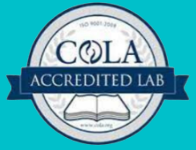


Did you know?
- Standard urine culture testing is inaccurate in up to 50% of cases.
- This means 1 in 2 women will be told that they don’t have a UTI when in fact they do.
FAQ
Urinary tract infections (UTIs) are common infections that affect the bladder, the kidneys and the tubes connected to them. Anyone can get them, but they’re particularly common in women. Some women experience them regularly (called recurrent UTIs). UTIs can be painful and uncomfortable, but can be treated with antibiotics.
Bacteria are the most common cause of UTIs, although fungi can also infect the urinary tract. The most common causative agent for both uncomplicated and complicated UTIs is uropathogenic. Escherichia coli, which live in the bowel. Other common species include Klebsiella pneumoniae, Proteus mirabilis, Enterococcus faecalis, and Staphylococcus saprophyticus.
- Low Bacterial Count: In some cases, the bacterial count in the urine may be too low to form visible colonies on the culture medium. This is particularly true in the early stages of infection or in cases of low-grade or chronic UTIs.
- Presence of Fastidious Organisms: Some bacteria have specific growth requirements and may be challenging to culture using standard media. Fastidious organisms may not thrive in the typical culture conditions, leading to false-negative results.
- Prior Antibiotic Use: If the patient has taken antibiotics before providing the urine sample, it may inhibit bacterial growth, making it difficult for the culture to detect the presence of bacteria. Antibiotics can suppress bacterial replication, affecting the ability to form colonies.
- Sampling Technique: Improper sampling techniques, such as contamination from the genital area during collection, can introduce non-pathogenic bacteria into the sample, potentially overshadowing the presence of true pathogens.
- Intermittent Shedding of Bacteria:Some infections may involve intermittent shedding of bacteria, meaning that bacteria are not consistently present in the urine. This intermittent shedding can result in negative culture results during periods when the bacteria are not actively being excreted.
- Viral or Fungal Infections: Standard urine culture tests primarily target bacteria, and they may not detect viral or fungal infections. In some cases, UTIs can be caused by viruses or fungi, and these may require specific tests for detection.
- Biofilm Formation:Some bacteria can form biofilms, which are communities of microorganisms embedded in a protective matrix. Biofilms can make it challenging for standard culture methods to isolate and identify the bacteria, as they may not be readily released into the urine.
- Atypical Pathogens: Not all UTIs are caused by typical bacteria that are easily cultured. Uncommon or atypical pathogens may require specialized culture conditions or alternative diagnostic methods for detection.
Unlike other tests such as culture tests which have 50% accuracy or test
strips which have 30% accuracy, ReliaHealth’s RT-PCR (Real Time Polymerase
Chain Reaction) also known as NAAT tests (Nucleic Acid Amplification Tests) are
98% accurate and can find evidence of disease in the earliest stages of
infection.
RT-PCR/NAAT tests work because they identify small amounts of DNA or RNA in the test samples. They can, therefore, be used to identify bacteria, viruses, and
other pathogens even when the material of interest is present in very small
amounts.
Other tests may miss early signs of disease because there aren’t enough
viruses, bacteria, or other pathogens in the sample, or your body hasn’t had
enough time to develop an antibody response. The patient is left suffering with
symptoms for extended periods of time until an infection can be determined.
With ReliaHealth’s RT-PCR technology, you don’t have to wait.
Polymerase Chain Reaction (PCR) technology was invented by Kary B. Mullis, an American biochemist. Mullis developed the PCR technique in 1983, and he was awarded the Nobel Prize in Chemistry in 1993 for this groundbreaking invention. Kary B. Mullis’ development of PCR revolutionized molecular biology and diagnostics. PCR has become an essential tool in various scientific fields, including genetics, forensics, and medical diagnostics. The ability to amplify and analyze DNA rapidly and efficiently has had a profound impact on scientific research and clinical diagnostics. https://www.nobelprize.org/prizes/chemistry/1993/mullis/facts/
Antibiotics are medicines used to fight bacterial infections. Over time, bacteria has developed resistance to antibiotics due to the over-prescription of these medicines in both humans and livestock.
An antibiotic resistance panel can help find out which antibiotic the bacteria in your UTI is resistant to so that you are not prescribed the incorrect treatment against the bacteria.
This is why ReliaHealth 2-in-1 UTI Test provides an antibiotic resistance panel which detects 24 antibiotic resistance genes found in the strains of bacteria that are most commonly the cause of UTIs.
This allows for the correct antibiotic prescription to fight off your infection and get rid of it for good.
Other names: antibiotic susceptibility test, antibiotic sensitivity testing, antimicrobial susceptibility test
Yes. 92% of UTI causing bacteria are resistant to at least 1 common antibiotic. 80% of UTI causing bacteria are resistant to at least 2 types of antibiotics. No matter if you’ve never had a UTI infection before in your life, the bacteria that cause the infection have overtime developed resistance due to many factors outside of your control.
Leaving a urinary tract infection untreated can spread the bacteria to other parts of your body and pose more dangerous health risks. An untreated UTI can travel to your kidneys. Kidney infection can cause permanent kidney damage or lead to sepsis, which is a life-threatening complication.
Test kits are shipped directly to your door using free overnight shipping or the fastest available shipping option based on your location. Test kits typically arrive within 1-3 business days. We also provide a prepaid shipping label on the return box so your return of the sample is seamless and arrives at the lab within a few days.
With ReliaHealth test kits your results are provided 1-2 business days after receiving your sample.
Your sample analysis and antibiotic sensitivity results can be downloaded directly from our HIPAA Compliant, private patient portal. Simply download and email your results to your doctor for treatment. You can also set up a Telehealth appointment with our partner Sesame by clicking here.
A same-day telehealth appointment is easy to set up with our partner Sesame. Click here to schedule a consultation today! Use code Sesame15 to receive 15% off your appointment.

